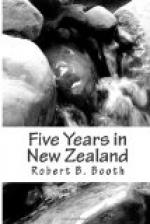[Illustration: THE GOLD DIGGINGS.]
A fortnight after our arrival our provisions ran short, and we were obliged to have recourse to the stores, of which two had been started by an enterprising firm in Dunedin, and soon after we were nearly having a famine, owing to the stores themselves running short by reason of the drays conveying supplies having been snowed up in crossing the pass. McLean was applied to, but he refused, and it was fortunate for him that a caravan arrived before the diggers were actually in want.
With this caravan arrived a pedlar and a liquor merchant, two such characters as cannot well be found except on a gold diggings. They carried with them a plentiful supply of slop clothes, boots, tools, and spirits, etc., and as luck—or ill luck—would have it, they pitched their camp alongside ours.
One of these men rarely did business without the other. If a digger came to purchase a pair of trousers or boots the bargain was never completed to the satisfaction of both parties without a glass of spirits at the adjacent grog shop to clinch it; and at night, when the diggers would drop round the latter for a glass, many pairs of breeches, boots, or other articles were disposed of under the happy influence of wine and company.
[Illustration: PEDDLARS AT THE DIGGINGS.]
These men are to be met with in all parts of the Colonies where crowds are collected, and they are usually of Jewish origin. There was nothing objectionable about them; they were simply shrewd, energetic men of business, ready without actual dishonesty to take every possible advantage of the wants and weaknesses of their fellow men. We had some pleasant evenings in their company, and many a jovial song and dance they treated us to, for which, no doubt, they succeeded in extracting good value for their wind and muscle.
Meat was scarce on the diggings, and at times for days together we had none. McLean indeed did not refuse to sell fat cattle, but he demanded prohibitive prices, and so it was customary to procure meat from a distance.
We had been now two months on the Lindis, our funds instead of increasing were diminishing, and we saw little or no hope of a change for the better. An exodus had already commenced, and the incomers were daily decreasing in number.
After holding a council meeting in our hut, it was decided that our camp be broken up, and that we should all return together as far as Davis’s station, from whence two should proceed to Dunedin with the dray, while the other two should purchase some fat beasts and drive them to the diggings for sale.
The tents and tools were disposed of to a newly arrived group of Australian diggers at a fair enough price, and we disposed of all the remaining gear we did not actually need on the return journey, taking with us little beyond the empty dray, and all being ready we bade farewell to the Lindis diggings, and once more started on our uncertain and adventurous travels.




